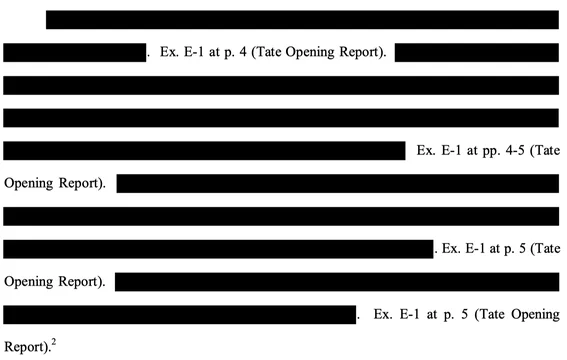
Most patent cases involve a protective order, and the parties tend mark documents other than prior art as confidential or attorney's eyes only. As a result, many of the more substantive filings—particularly discovery motions, summary judgment motions, and pretrial orders—are filed under seal.
Unlike some other jurisdictions, particularly the Northern District of California, the District of Delaware's procedure for filing under seal is not burdensome. Once a protective order is entered, no motion is required to file a document under seal, and the parties simply file redactions within seven days.
Over time, parties have become more and more liberal with their redactions, often heavily redacting sealed filings, and redacting exhibits in their entirety. A set of appendices for summary judgment briefing, for example, might involved hundreds or thousands of pages of documents that were produced under a protective order. Frequently, parties will simply redact all exhibits that were marked as confidential in their entirety rather than sorting out what may or may not need to be marked as confidential.
But—as discussed below—that may need to change in light of recent orders from Judges Connolly, Andrews, and Fallon.
Why Do Parties Redact So Heavily in Patent Cases?
There are several reasons. It can be tough to coordinate among counsel and clients to determine which parts of a document may be public information, and which parts may contain information that can be redacted.
Attorneys aren't big fans of the process. It's difficult, tedious and time consuming to pick through a document line-by-line to determine what may be confidential. It involves big risks if something is missed, and few direct rewards.
Clients don't like it either. They sometimes do not see see the time spent as worthwhile, and it may raise the question of whether it was really necessary to cite the confidential materials in the first place. If there is an option to simply redact everything in the exhibits and not risk disclosure of anything, rather than paying attorneys to pick through it, that is a clear winner.
Judges Connolly and Andrews Have Been Cracking Down on Sealed Filings Generally
Because redacting things is hard, and the Court has generally permitted redactions-in-full in the past, attorneys tend to freely cite confidential materials in their briefing, knowing that they can be attached and redacted in full.
That is changing. Last year, following the Third Circuit's Avandia opinion in 2019, now-Chief Judge Connolly issued his widely-circulated "star chamber" opinions, both of which involved appointing Dean Rodney A. Smolla of Widener University as a special master to evaluate the propriety of sealed filings or motions to seal (at the parties' expense). This resulted in the un-sealing of multiple previously-sealed documents.
As Chief Judge Connolly explained in both opinions, the public's right of access is presumed, and that presumption is hard to overcome:
The District Court is not a Star Chamber. We are a public institution in a democratic republic and the public has a presumptive right of access to our filings. That right is founded in the common law and "antedates the Constitution." . . . The public's right of access is not absolute; but it is strongly presumed, and it can be overcome only if a party demonstrates that public disclosure of a filing will result in "a clearly defined and serious injury."
Genentech, Inc. v. Amgen Inc., C.A. No. 17-1407-CFC, 2020 U.S. Dist. LEXIS 54775, at 11 (D. Del. Mar. 30, 2020) (citations omitted); see In re Storag Etzel GmbH, C.A. No. 19-109-RGA, 2020 U.S. Dist. LEXIS 97953, at 10-11 (D. Del. Mar. 25, 2020) (similar text).
Judge Andrews has also been active on this issue, and described his efforts in 2019:
In my experience, corporate parties in complex litigation generally prefer to litigate in secret. To that end, discovery is over-designated as being confidential, pleadings and briefs are filed under seal, redacted versions of sealed documents are over-redacted, requests are made to seal portions of transcripts of judicial proceedings, and parties want to close the courtroom during testimony. I have tried over the years to rein these tendencies in, but it is difficult because there is usually no one opposing whatever requests are made, and I do not have time to be independently monitoring any of these tendencies unless they are directly requested of me (i.e., requests to close the courtroom and to seal judicial transcripts). I have made some efforts on the requests that are specifically directed to me. I think some of those efforts have resulted in greater exercise of discretion by the parties in asking to have judicial transcripts sealed and in seeking to close the courtroom, but I do not see any impact on any of the other areas of potential abuse.
Takeda Pharm. U.S.A., Inc. v. Mylan Pharm., Inc., C.A. No. 19-2216-RGA, 2019 U.S. Dist. LEXIS 218029, at *1 (D. Del. Dec. 19, 2019).
In that case, the parties redacted information that had already been filed publicly in a prior action. He rejected most of the redactions and ordered the parties to file an affidavit supporting each sealed filing going forward:
[G]iven the parties' behavior to date, no further filings may be made under seal in this case unless contemporaneously accompanied by the proposed redacted version and a detailed affidavit of the filing party that meets the Avandia standard for sealing court filings.
In another Judge Andrews case related to discovery for a pending arbitration, the parties had a contractual agreement to keep the arbitration secret, and as such, they redacted a large number of documents ("105 documents totaling 1,551 pages"). In re EWE Gasspeicher GmbH, C.A. No. 19-109-RGA, 2020 U.S. Dist. LEXIS 45850, at *10 (D. Del. Mar. 17, 2020). The Court issued an order to show cause as to why all of the materials should not be made public. Id. at *13. The decision on those documents is still pending.
New Orders from Judges Andrews and Fallon: No More Free Ride on Sealed Exhibits?
Until recently, I hadn't seen any across-the-board rejections of the very common practice of redacting exhibits in their entirety. But now we're starting to see such orders. But in the last two weeks, Judge Andrews has repeatedly rejected exhibits for being redacted in their entirety, with docket entries like this:
ORAL ORDER: The redacted filing (D.I. 181) is REJECTED because parts of it are redacted in their entirety. Absent a compelling reason, supported by a statement under oath by a party, redactions in their entirety are impermissible; redactions must be done so as to redact the least possible amount of the materials submitted. Failure to make a good faith attempt at such redactions may result in sanctions, the most common of which would be simply unsealing the entire filing. Redacting in its entirety a document that contains publicly available materials is prima facie evidence of bad faith. Revised redacted filings are DUE within five business days.
Conformis, Inc. v. Medacta USA, Inc., C.A. No. 19-1528-RGA, D.I. 185 (D. Del. Aug. 16, 2021).
He has entered similar orders in three separate cases so far. See id.; Ingevity Corporation et al v. BASF Corp., C.A. No. 18-1391, D.I. 510 (D. Del. Aug. 13, 2021); IPA Technologies Inc. v. Amazon.com, Inc., C.A. No. 16-1266-RGA, D.I. 368 (D. Del. Aug. 9, 2021).
Likewise, as we noted last month, Judge Fallon also issued a similar order in another Judge Andrews action.
Between these orders and Judge Connolly's unambiguous rejection of over-sealing documents in his star chamber opinions, two of the four district court judges have made clear that they are going to look at redacted versions of sealed filings very carefully, and that a party who over-redacts may risk having their documents disclosed in full on the public docket.
Of the other two D. Del. district judges, Judge Stark has not challenged over-redaction in filings to my knowledge, but he has regularly rejected requests to redact transcripts, court opinions, and sometimes discovery responses. Judge Noreika has few orders on this issue either way, but she has denied at least one motion to redact a transcript.
All told, given that cases have sometimes been re-assigned between judges in the past, it is becoming clear that counsel needs to think carefully before redacting full exhibits in any case.
Update 10-15-2021: Judge Fallon has issued a similar order in at least one Judge Connolly action, showing that her orders are not limited to Judge Andrews cases. See Volterra Semiconductor LLC, v. Monolithic Power Systems, Inc., C.A. No. 19-2240-CFC-SRF (D. Del. Oct. 15, 2021) (oral order).
If you enjoyed this post, consider subscribing to receive free e-mail updates about new posts.





